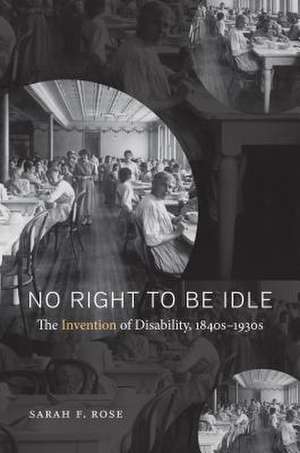No Right to Be Idle
Autor Sarah F. Roseen Limba Engleză Hardback – 29 ian 2017
By tracing the experiences of policymakers, employers, reformers, and disabled people caught up in this epochal transition, Rose masterfully integrates disability history and labor history. She shows how people with disabilities lost access to paid work and the status of "worker--a shift that relegated them and their families to poverty and second-class economic and social citizenship. This has vast consequences for debates about disability, work, poverty, and welfare in the century to come.
| Toate formatele și edițiile | Preț | Express |
|---|---|---|
| Paperback (1) | 316.30 lei 6-8 săpt. | |
| The University of North Carolina Press – 3 apr 2017 | 316.30 lei 6-8 săpt. | |
| Hardback (1) | 592.29 lei 6-8 săpt. | |
| The University of North Carolina Press – 29 ian 2017 | 592.29 lei 6-8 săpt. |
Preț: 592.29 lei
Preț vechi: 769.22 lei
-23% Nou
Puncte Express: 888
Preț estimativ în valută:
113.35€ • 117.10$ • 94.34£
113.35€ • 117.10$ • 94.34£
Carte tipărită la comandă
Livrare economică 25 martie-08 aprilie
Preluare comenzi: 021 569.72.76
Specificații
ISBN-13: 9781469630083
ISBN-10: 1469630087
Pagini: 398
Dimensiuni: 155 x 235 x 25 mm
Greutate: 0.79 kg
Editura: The University of North Carolina Press
ISBN-10: 1469630087
Pagini: 398
Dimensiuni: 155 x 235 x 25 mm
Greutate: 0.79 kg
Editura: The University of North Carolina Press
Notă biografică
Sarah F. Rose is associate professor of history and director of the Disability Studies Minor at the University of Texas at Arlington.
Descriere
Descriere de la o altă ediție sau format:
During the late nineteenth and early twentieth centuries, Americans with all sorts of disabilities came to be labelled as ""unproductive citizens"". As Sarah F. Rose explains, a perfect storm of public policies, shifting family structures, and economic changes barred workers with disabilities from mainstream workplaces and simultaneously cast disabled people as morally questionable dependents.
During the late nineteenth and early twentieth centuries, Americans with all sorts of disabilities came to be labelled as ""unproductive citizens"". As Sarah F. Rose explains, a perfect storm of public policies, shifting family structures, and economic changes barred workers with disabilities from mainstream workplaces and simultaneously cast disabled people as morally questionable dependents.









